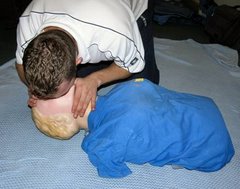Epilepsy
Recognition:
Petit mal:
- These are temporary absences - the casualty just seems dazed, staring into thin air and not aware of their surroundings.
- The casualty usually knows just before they will have a grand mal seizure - they just have an instinct.
- The casualty tenses up, falls to the ground and experience convulsions.
- Sometimes froth appears at the mouth.
- Occasionally they may become pale if they have trouble breathing.
Petit mal:
- The casualty will naturally recover within a few minutes.
- Protect the casualty by trying to break their fall and removing dangerous objects from around them.
- If possible try and protect the casualty's head by padding underneath it - a towel or coat would be ideal.
- Monitor the casualty's airway and breathing.
- The seizure should subside within a few minutes.
- If the casualty stops breathing be prepared to resuscitate.
- The casualty is likely to be very tired and confused after they come out of the seizure.
- Advise the casualty to seek medical attention afterwards.



